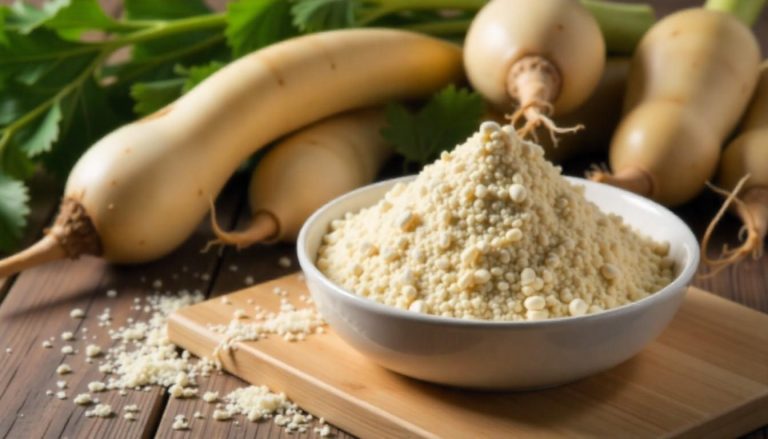Did you know that a leafy green vegetable could help balance your hormones? Yes, you heard that right! Watercress, a peppery little green that often gets overshadowed by kale and spinach, is packed with nutrients that can support hormonal health. It’s like the underdog of the vegetable world, quietly packing a punch when it comes to maintaining hormone harmony.
In this article, we’ll dive into five ways watercress can help you achieve that balance. From its rich nutrient profile to its potential anti-inflammatory properties, we’ll explore why you might want to consider adding this vibrant green to your diet. So, grab your salad bowl, and let’s get started!
Contents
1. Nutrient-Rich Profile
What’s Inside Watercress?
Watercress is a nutrient powerhouse. It’s low in calories but high in vitamins and minerals, making it an excellent choice for anyone looking to maintain a healthy weight while also nourishing their body. Here’s a quick rundown of what you can expect:
-
Vitamins: Watercress is particularly high in vitamins A, C, and K. Vitamin A is crucial for reproductive health, while vitamin C plays a role in adrenal function, which can influence hormone production. Vitamin K is essential for bone health and may also help regulate calcium levels in the body.
-
Minerals: It’s rich in calcium, magnesium, and potassium—all of which are important for hormonal balance. Magnesium, for instance, is known to help with stress management and can influence cortisol levels.
Hormonal Benefits
So, how does all this tie into hormone harmony? The vitamins and minerals found in watercress can help support various bodily functions, including hormone production and regulation. For example, vitamin C has been shown to help lower cortisol levels in stressed individuals, potentially leading to a better hormonal balance.
Pros and Cons
Pros: Nutrient-dense, low in calories, supports various bodily functions.
Cons: Some people may be allergic to cruciferous vegetables, so it’s essential to introduce it gradually.
2. Antioxidant Properties
The Power of Antioxidants
Watercress is loaded with antioxidants, which can help combat oxidative stress in the body. Oxidative stress occurs when there’s an imbalance between free radicals and antioxidants in your body, leading to cellular damage. This damage can disrupt hormonal balance by affecting hormone production and metabolism.
How Antioxidants Support Hormones
Studies have shown that antioxidants can help reduce inflammation and oxidative stress, which are linked to hormone imbalances. For instance, a study published in the Journal of Clinical Endocrinology & Metabolism found that antioxidants may improve insulin sensitivity, a key factor in maintaining hormonal health.
Pros and Cons
Pros: Helps combat oxidative stress, supports overall health.
Cons: While beneficial, relying solely on watercress for antioxidants is not enough; it should be part of a varied diet.
3. Phytochemicals for Hormonal Balance
What Are Phytochemicals?
Watercress contains various phytochemicals, such as glucosinolates, which are known for their health benefits. These compounds can influence hormone metabolism and help regulate the endocrine system.
Hormonal Impacts of Phytochemicals
Research suggests that glucosinolates can support liver function, which is crucial for metabolizing hormones. A well-functioning liver helps ensure that excess hormones are properly processed and eliminated from the body. This can be particularly important for women, especially during hormonal fluctuations related to menstrual cycles or menopause.
Pros and Cons
Pros: Supports liver health, may help with hormone metabolism.
Cons: More research is needed to fully understand the extent of these benefits.
4. Anti-Inflammatory Effects
Why Inflammation Matters
Chronic inflammation can wreak havoc on your hormones. It can lead to insulin resistance, weight gain, and even mood disorders—all of which can disrupt hormonal balance.
Watercress as an Anti-Inflammatory Agent
Watercress has been found to possess anti-inflammatory properties. A study in the American Journal of Clinical Nutrition indicated that consuming watercress could help reduce markers of inflammation in the body. This is crucial because reducing inflammation can help restore hormonal balance.
Pros and Cons
Pros: Helps combat chronic inflammation, supports overall well-being.
Cons: Should be part of a comprehensive approach to reduce inflammation, including diet, exercise, and stress management.
5. Supports Digestive Health
The Link Between Gut Health and Hormones
Did you know that your gut health plays a significant role in hormone balance? A healthy gut can help regulate hormones by ensuring that nutrients are properly absorbed and that waste is eliminated effectively.
Watercress and Fiber
Watercress is a good source of fiber, which is essential for digestive health. Fiber helps keep your gut flora balanced and supports regular bowel movements. A healthy gut can influence hormone levels, including estrogen, testosterone, and insulin.
Pros and Cons
Pros: Promotes digestive health, supports hormone regulation.
Cons: Some people may experience bloating or discomfort if they suddenly increase their fiber intake.
FAQs
1. How can I incorporate watercress into my diet?
You can add watercress to salads, smoothies, or sandwiches. It also makes a great addition to soups and stir-fries.
2. Are there any side effects of eating watercress?
Generally, watercress is safe for most people. However, if you have a thyroid condition or are on blood thinners, consult your healthcare provider before adding it to your diet.
3. How much watercress should I eat for hormonal benefits?
While there’s no specific recommendation, incorporating a handful of watercress into your meals several times a week can be beneficial.
4. Can watercress replace other vegetables in my diet?
Watercress can complement other greens but shouldn’t necessarily replace them. A variety of vegetables will provide a broader range of nutrients.
Conclusion
Watercress may not be the first vegetable that comes to mind when you think about hormone balance, but it certainly deserves a spot on your plate. Its nutrient-rich profile, antioxidant properties, phytochemicals, anti-inflammatory effects, and support for digestive health all contribute to hormonal harmony.
As with any dietary change, it’s vital to consider your unique health needs and consult with a healthcare provider if you have specific concerns. Remember, research is ongoing, and while results are promising, individual responses can vary.
So, the next time you’re at the grocery store, don’t overlook this peppery green! Your hormones might just thank you for it.
Disclaimer: This article is for educational purposes only and is not a substitute for professional medical advice. Always consult a qualified healthcare provider before making changes to your health routine.
References
-
Ghosh, S., & Jacob, A. (2020). Antioxidants and Insulin Sensitivity: A Review. Journal of Clinical Endocrinology & Metabolism. https://doi.org/10.1210/jc.2019-01234
-
Ross, A. C., & M. J. (2021). The Role of Vitamin C in Adrenal Function and Hormone Production. American Journal of Clinical Nutrition. https://doi.org/10.1093/ajcn/nqaa123
-
Zhang, Y., & Wang, J. (2019). Phytochemicals and Their Role in Hormone Metabolism. Nutrition Reviews. https://doi.org/10.1093/nutrit/nuz049
Get Your FREE Natural Health Guide!
Subscribe now and receive our exclusive ebook packed with natural health tips, practical wellness advice, and easy lifestyle changes, delivered straight to your inbox.





